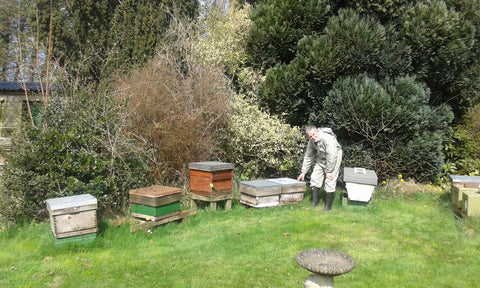
Based in North Bovey, Dartmoor Wild Flower Honey is run by expert beekeeper Peter Hunt who has been beekeeping ever since he was 12. As well as managing his own 100+ beehives, at various locations from the banks of the River Tamar to around 15 hives in his garden, Peter also offers advice to other beekeepers and bee swarm removal services. We’ve recently stocked Dartmoor Wild Flower Honey in our Thunder & Lightning Cream Tea and will be adding it to more food hampers soon, so we caught up with Peter to find out more about his honey and answer some common honey questions.
What are the main differences between locally produced and supermarket honey?
There are two key differences:
1. Honey supplied to supermarkets is often over-heated in an attempt to prevent the honey from crystallising; however this process requires the honey to be given additional filtering, which can weaken the flavour.
2. Unlike other commercially farmed parts of the country, Dartmoor has small field systems that are not intensively farmed, resulting in more hedgerows and a larger variety of wild flowers for the bees to source nectar, giving the honey more flavour.
Does local honey taste better than supermarket honey?
Yes, as Dartmoor bees source their nectar from a broader variety of wild flowers this gives the honey more flavours. It’s also worth noting than sometimes honey at shows is judged on its clarity, but in order to get this clarity it’s filtered multiple times compromising flavour.
What’s the best way to stop honey crystallising?
The temperature at which honey is stored doesn’t usually make a difference to the rate at which it crystallises. However, avoiding dry conditions can help, although this can be harder to control. It is worth noting that crystallised honey is still perfectly good to eat, but you may wish to warm it slowly in warm water to create a runnier consistency.
What are the main factors influencing honey production?
The honey producing season is from April to September and bees don’t work in the rain! So, for a good honey year, beekeepers need a dry summer.
To find out more about Peter visit his website http://www.beesindevon.co.uk.

